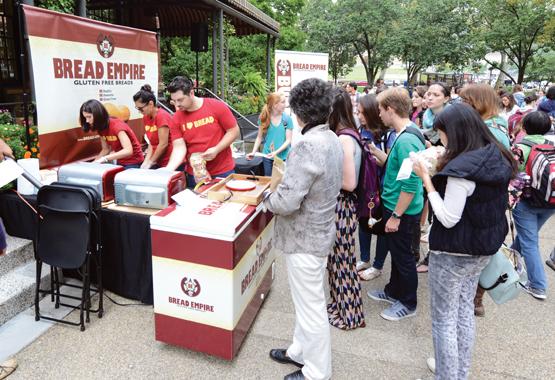Snacks, games promote gluten-free options

September 19, 2013
Although Dana Field got sick more often than most kids, she became unusually ill when she was 14. In the span of about two months that year, she lost 50 pounds. To make things worse, she felt perpetually fatigued.
“All of the symptoms I was having weren’t making sense,” she said.
Field’s doctor, believing Field to be anorexic, referred her to behavioral specialists. After the behavioral specialists failed to identify what was making Field sick, she consulted another doctor, who finally diagnosed her with celiac disease.
The disease was the focus of the second annual Gluten-Free Awareness Carnival, which was held Thursday from 11 a.m. to 3 p.m. on the William Pitt Union lawn. For those who suffer from the genetic disease, certain grains damage the small intestine. Gluten-Free My Campus, an advocacy group for those who suffer from celiac disease, organized the carnival, which is the club’s main event of the year.
More than 1,000 people attended the carnival, according to the Gluten-Free My Campus President Dhanu Thiyagarajan.
Thiyagarajan, a junior bioengineering major on the pre-med track, created the club in October 2011 during her freshman year after attending the activities fair and seeing an absence of gluten-free clubs. The club organized the event to raise awareness of celiac disease and to educate the public on gluten-free food options.
At the event, a total of 40 booths, including eight set up by local restaurants, boasted samples, coupons, invitations to use certain products, games and information about eating a gluten-free diet and about celiac disease.
Gina Snyder, the owner of Sunny Bridge Natural Foods, located in McMurray, Pa., set up one of the booths on the lawn to display menus, gluten-free cupcakes and cookies from the gluten-free bakery she owns. She opened the bakery two years ago, after maintaining a store for 11 years.
“I felt there was a need for it,” Snyder said. “When someone comes in with celiac disease, they know everything is OK.”
Both Snyder’s store and her bakery use only local and organic ingredients.
To replace wheat, she uses rice, tapioca or potatoes. To give the bakery products their “stickiness,” she uses xanthan, a carbohydrate often found in gum.
Ben Josefoski, a general manager for Noodles & Company, displayed the restaurant’s gluten-free options. The restaurant uses rice noodles and a combination of corn and rice to provide alternatives suitable for individuals with celiac.
Mark Dinga, a UPMC dietician, was also at the carnival to answer questions about symptoms and testing.
“If a person has celiac disease and doesn’t know it, every time they consume gluten, the body reacts,” he said. “Antibodies are produced, which are actually damaging to the small intestine.”
Dinga, who has celiac disease himself, compared a normal intestine to a shag carpet. The antibodies make the intestine like linoleum, causing nutrients to slide through instead of being absorbed.
Dinga said that poor nutrient absorption is part of celiac disease. For this reason, many gluten-intolerant people might be recognizable through traits not immediately connected to the disease, such as short stature, low body weight and osteoporosis.
Although Field, a junior at Seton Hill University, is not a member of Gluten-Free My Campus, she initially planned to attend the carnival Thursday. She had to change her plans when she came down with the flu Wednesday. She said she wanted to attend the event to find more restaurants in the area that offer gluten-free options.
Freshman Jessica Yaukey, a member of Gluten-Free My Campus, said she thought the carnival went well, and she was excited that she could eat all of the food rather than limiting herself to a few options.
Several students who attended the event were not gluten-free. Adam White, a freshman mechanical engineering major, came for the free food and games and was pleased to find that the food tasted good.
Morgan Cooper-Okerchiri, a sophomore finance major, who also doesn’t typicall eat gluten-free, said that she, to her surprise, enjoyed the samples at the carnival.
“I had a preconceived notion that gluten-free food wasn’t tasty. I wanted to try it out. Why not? It’s free food.”
Thiyagarajan described the club as an emotional support group and said she wants the students and faculty to learn “how hard it is to lead a gluten-free lifestyle.” The carnival was a step in accomplishing that.
“It’s not just a fad,” she said. “It’s for a medical reason.”


